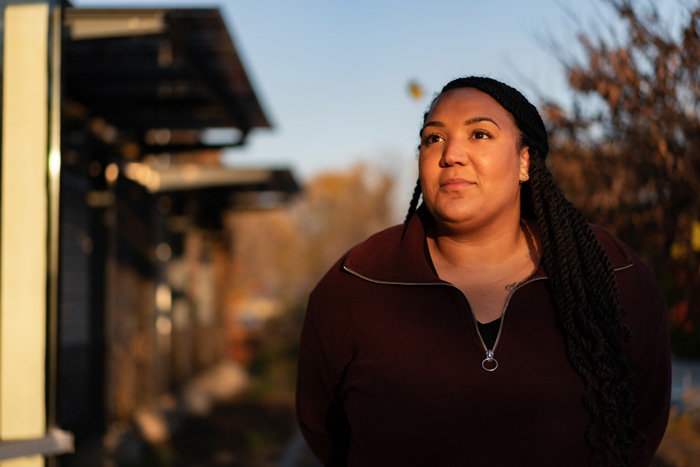Technology Isn't Quite Going to Save Us All This Time

Allyssa Decker outside of Kaufman Hall, home of the Department of Environmental Studies & Environmental Science. Photo by Dan Loh.
Office Hours: Allyssa Decker, Assistant Professor of Environmental Studies
by Tony Moore
Assistant Professor of Environmental Studies Allyssa Decker earned her Ph.D. at Kansas State University. She teaches such courses as Green Infrastructure, Integrative Environmental Science and Urban Sustainability.
This seems like a question that could answer itself while stretching across countless words that fill volumes, but let’s just do it: Why is Dickinson the place to go for students to take that deep dive into environmental science?
Dickinson was the first college to introduce field studies into its science curriculum, and we have one of the oldest environmental studies and science departments in the nation. I’m lucky to work with an outstanding group of faculty that are very passionate about their areas of research and teaching and have a wide range of educational and research backgrounds that provide a breadth of course topics and fields of research. Our department has created a curriculum that allows students to gain the introductory knowledge needed to succeed as they work through their educational journey, but the curriculum also has a nice level of flexibility that allows our students to curate a specific coursework plan that is centered on their personal interests.
Technology seems to be the cause of and solution to a lot of big problems, and discussion of its role in addressing climate change is embedded in your courses. Will technology be able to stop climate change in its tracks one of these days, or will it just help us deal with it?
I love this question, because it’s one that often comes up in one of the introductory environmental science courses that I teach. We investigate the climate crisis by viewing Earth as a system along with looking at the data on greenhouse gas emissions and changes in land-use practices. We can see that through human development, we have greatly disrupted the balance of Earth's system and the intensity of the greenhouse effect. There have been great advancements around carbon capture and renewable energy initiatives to limit greenhouse gases in the atmosphere, but I don't think we can innovate our way out of climate crisis. We need serious policy change to limit emissions on a global scale and intensive climate-adaptation and -mitigation strategies.
To me, there’s no longer game to play than working toward “meeting the needs of the present without compromising the ability of future generations to meet their own needs,” as the UN defines sustainability. How do you, and humanity, maintain momentum in this colossal task?
I think the main pathway for maintaining momentum is to find topics or sectors of sustainability that you love. The folks that know me know I am quite obsessed with plants, and I love investigating ways to re-green our cities. I am extremely passionate about understanding the intersections between environmental concepts, urban design and resilience thinking. Thus, my commitment to climate resilience and sustainability is to continue researching ways to green our cities to enhance the wellbeing of urban dwellers like me to help with our community's climate change adaptation and mitigation strategies, along with using my knowledge and expertise in this field to educate and engage with our students.
TAKE THE NEXT STEPS
Published January 9, 2024